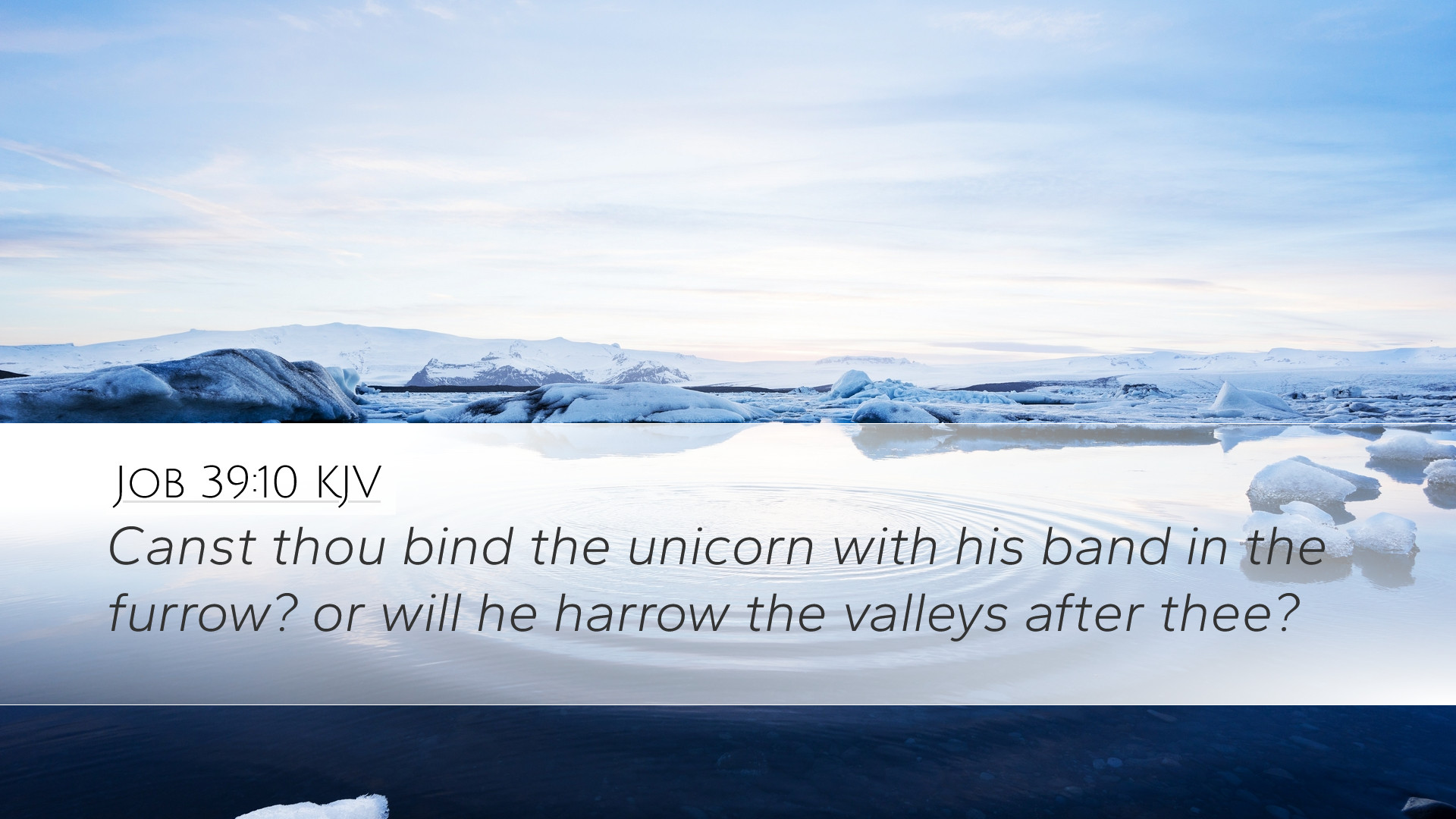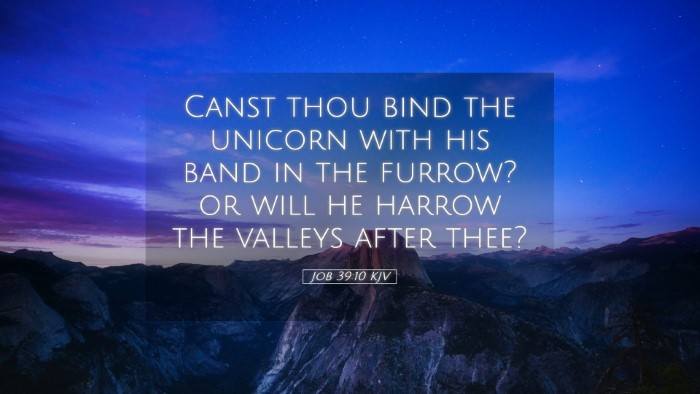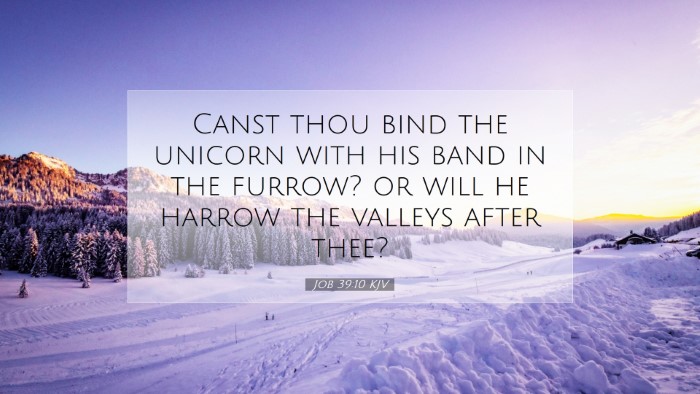Old Testament
Genesis Exodus Leviticus Numbers Deuteronomy Joshua Judges Ruth 1 Samuel 2 Samuel 1 Kings 2 Kings 1 Chronicles 2 Chronicles Ezra Nehemiah Esther Job Psalms Proverbs Ecclesiastes Song of Solomon Isaiah Jeremiah Lamentations Ezekiel Daniel Hosea Joel Amos Obadiah Jonah Micah Nahum Habakkuk Zephaniah Haggai Zechariah MalachiJob 39:10
Job 39:10 KJV
Canst thou bind the unicorn with his band in the furrow? or will he harrow the valleys after thee?
Job 39:10 Bible Commentary
Commentary on Job 39:10
This verse is a profound inquiry into the natural order and the artistry of God in creation, specifically regarding the strength and capabilities of the wild ox, often identified as the 'unicorn' in certain translations. Here, we will synthesize insights from several public domain commentaries, including those by Matthew Henry, Albert Barnes, and Adam Clarke to unfold a cohesive understanding aimed at pastors, students, theologians, and biblical scholars.
Text of Job 39:10
“Canst thou bind the unicorn with his band in the furrow? or will he harrow the valleys after thee?”
Introduction to the Context
The Book of Job is a poetic exploration of suffering, divine justice, and the relationship between humanity and God. In chapters 38-41, God poses a series of questions to Job, demonstrating His sovereignty and the limitation of human understanding. Job 39 focuses on God’s creation, particularly the wild creatures that inhabit the earth, illustrating both the majesty and mystery of God’s purposes.
Exegesis of Job 39:10
In this verse, God asks Job if he can bind the wild ox, suggesting the innate untamability and strength of this majestic creature. This rhetorical question serves as a direct challenge to Job's understanding of nature’s order and God's dominion over it.
The Wild Ox: Symbolism and Strength
Matthew Henry notes that the “unicorn” (a term that can refer to a wild ox) is emblematic of unbridled power and freedom. The imagery here reflects the inability of human beings to control or bind something that is inherently wild and free, drawing attention to the limitations of mankind in contrast to God’s omnipotence. This reflects a broader theme in the Book of Job regarding the human condition and divine sovereignty.
Human Limitations
According to Albert Barnes, the purpose of God's question to Job is to highlight his limitations in wisdom and power compared to the Creator. By continually focusing Job’s attention on the wild ox, God invites Job to reflect on the larger realities of nature that are beyond human control. This serves as a reminder that one’s ability to comprehend and manipulate creation is limited, reinforcing the majesty of God’s creative work.
The Role of the Wild Ox in Creation
Adam Clarke provides insight into the natural roles these creatures play in their ecosystems. While God poses the question rhetorically, the underlying message emphasizes the specific roles that animals have, each fulfilling their God-ordained purpose. The wild ox may symbolize strength in nature and serves as a reminder that God has lovingly designed each creature with a unique purpose, one that is majestic yet untamed.
Theological Implications
The ruminations generated by Job 39:10 prompt significant theological reflections regarding the nature of God as the creator and sustainer of all things. The verse touches on several key themes:
- God’s Sovereignty: The ability of God to create and maintain the natural order displays His supreme power. This challenges believers to recognize their place within creation and the authority of God over all living beings.
- The Nature of Creation: Understanding the wild ox's untamability can be reminiscent of God’s creation being made “good,” yet free. It offers a lens to view creation from the perspective of God's intentionality rather than mere happenstance.
- Human Responsibility: While humans are called to steward creation, they must acknowledge their limitations. This calls for humility before God and the acceptance that certain aspects of creation will always remain beyond human influence.
- The Question of Suffering: In the context of Job's suffering, this verse reminds believers that not all of life can be controlled or understood, echoing the broader theme of suffering being a mystery in the divine plan.
Conclusion
Job 39:10 serves as a cornerstone in understanding the relationship between God, humanity, and the created order. Through His questions, God does not only challenge Job's perception but also offers profound insights into the nature of divine authority and human limitation. Pastors and theologians can utilize this verse to engage their congregations in discussions about the wildness of creation, divine sovereignty, and the mystery embedded in the human experience. This passage ultimately invites reflection on the awe-inspiring nature of God, the ungraspable depths of His wisdom, and the awe-inspiring complexities of His creation.
As we ponder these truths, may we grow in our reverence for God’s work in the world and strive to both understand and accept our place within it.


